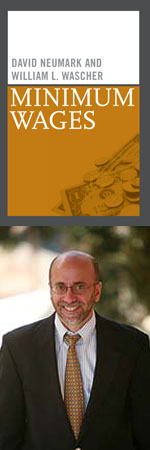Minimum wage revisited

Minimum wage revisited
- November 5, 2008
- New book explores how increases to minimum wage, similar to those proposed by Obama, will hurt young workers, economy
 As Barack Obama prepares to take office as the nation's 44th president, the American
public is preparing itself for a number of new changes sure to follow in his wake.
As Barack Obama prepares to take office as the nation's 44th president, the American
public is preparing itself for a number of new changes sure to follow in his wake.
Included among his plan for strengthening the economy is an increase to the federal
minimum wage, a move UC Irvine economist David Neumark warns against in his new book,
Minimum Wages. Set to hit shelves this Friday, the book draws upon his and co-author William L.
Wascher's more than fifteen years of expertise on the topic in a comprehensive overview
of the policy's distributive effects across different population groups. Their findings
ultimately lead them to conclude that an increase yields no long term, net positive
returns, a position which stands in stark contrast to beliefs held by the now Democratically-controlled
White House, Senate and House majority.
"As with any one plan or policy, there are winners and losers," says Neumark. "Unfortunately,
in the case of increasing the minimum wage, there are more losers than winners," he
adds, explaining that among them are some of the very people the increased wage is
purported to help.
"There is a common misconception that a majority of minimum wage earners are poor,"
he says. "The two, however, are not synonymous. Teenagers actually make up one of
the largest sectors of the population who work minimum wage jobs," he explains, adding
that teens earn these wages while going to school, living with parents or on their
way to higher paying jobs. When the minimum wage level goes up, teens are pitted against
older, more skilled adults for the same jobs. The outcome, says Neumark, is one of
two scenarios.
"Teenagers either wind up working less and thus have less work experience to draw
from in the long run, or they quit school to work because they can make enough money
to survive without a formal education."
In either case, the increased minimum wage negatively impacts their long term acquisition
of advanced skills as well as their ability to earn higher wages - outcomes Neumark
explains in Minimum Wages that will inevitably play out negatively for the economy in terms of creating a lower
skilled pool of human capital.
"When looking at ways to increase the incomes of poor and low-income families, I'd
advise Obama and other policymaker to steer clear of increases in the minimum wage,
and instead to focus on policies that increase skills and strengthen incentives to
work," Neumark says.
Learn more about Minimum Wages online.
Neumark, in addition to his role as an economics professor at UCI, is also a research
associate at the National Bureau of Economic Research, senior fellow at the Public
Policy Institute of California, and research fellow at the Institute for the Study
of Labor.
Wascher is the associate director of the Division of Research and Statistics at the
Federal Reserve Board.
Share on:


connect with us: